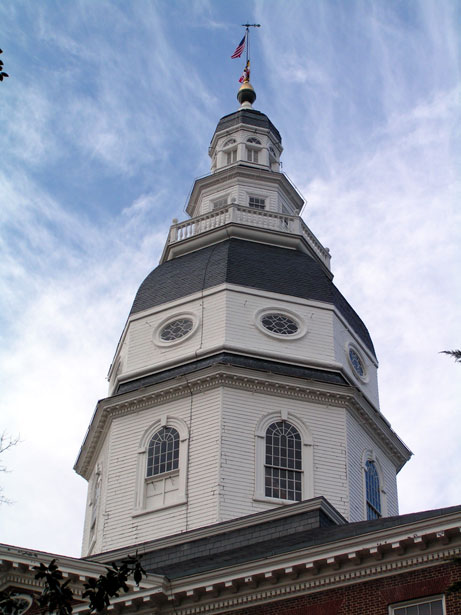Yesterday, March 20, 2017, the first official day of spring, was – in the Maryland legislature – also “Crossover Date.” Crossover date is a big deal! For a bill to pass and become law, it must be approved by both chambers. If a bill fails to “cross over,” it is most probably dead for this session. Please note the equivocation on that: “most probably.” As with every rule, there is an exception: a bill could still be resurrected via “Rules.” But for a bill sponsor to do that, he or she is using up a chit, so they will usually reserves those chits for something about which they are quite passionate and still has a good chance of passing. But yes, it is possible to resurrect a bill that appears to be dead, and give it new life. It’s springtime, right?
The next important date is the 83rd day of session, when both Chambers must pass a budget bill: April 3, 2017.
The final important date is “SINE DIE” – which is when the General Assembly adjourns, precisely 90 days after being called to order, which this year falls on April 10. Between now and April 10th, things will be crazy-hairy! Like following hounds in full cry, the last few weeks of session are an adrenalin rush unique to elected officials, lobbyists and those that support them.
There are some important aspects of the budget bill which which, if passed, could impact the horse industry, but given how fast things will move now, what is true today might not be true tomorrow, so we will wait to explore how the budget will affect our industry until after session concludes.
In the updates below, The Equiery uses the following terms with the associated meanings:
- “Stalled” or “stalled out” can refer to bills that has had hearings weeks ago but no action has happened, or it can refer to bills that have been filed but have yet to receive a hearing, and at this late date are unlikely to have a hearing. This is one way a bill can die in committee, without overtly killing: death by neglect.
- The Equiery uses “killed” to refer to a bill that receives an unfavorable report from its committee. To report a bill out unfavorably, i.e. to kill a bill, sends a much stronger message than just allowing a bill to die of neglect.
- “Crossed over” means a bill was voted on favorably by its committee and by its house (House of Delegates or the Senate), and has “crossed over” into the other house, and thus is very much alive and kicking.
If we already reported that a bill was dead, we have not included it in this update.
ANIMAL WELFARE, NEGLECT & CRUELTY
SB 631/HB941 Animal Abuse Emergency Fund
Well well well. Just when it looks like a bill stalled out, voila, it is back in play. Both House and Senate versions were passed with amendments and have crossed over. Each version was amended to include identical sunset clauses. These bills are ripe for becoming law.
What would this law provide? If this bill becomes a law, it would require specified fines to be remitted to the Animal Abuse Emergency Compensation Fund; that an Animal Abuse Emergency Compensation Fund be established; would provide for the uses, purposes, sources of funding, investment of money, and auditing of the Fund; require the Executive Director of the Governor’s Office of Crime Control and Prevention (GOCCP) to administer the Fund; provide that the Fund is a continuing, nonlapsing fund not subject to specified provisions of law; etc.
The various county animal control divisions have long been seeking a mechanism by which they can pay for contracts with non-profits to shelter and care for seized animals. While most local animal control can handle small animals, they are generally not equipped to handle livestock. This, theoretically, could help them find ways to accommodate seizure of livestock.
SB 790/HB 455 Animal Cruelty standards.
As it had the backing of the States Attorneys Association, and given the simplicity and the purpose of the bill, these were bills that had high odds of passage from the get-go – and they have. Each version has been passed without amendments and has crossed over to the opposite chamber. This bill essentially cleans up and organizes the existing statutes so that when individuals are charged with misdemeanor or felony neglect or cruelty, the charges are more clearly defined.
LAND-RELATED
HB 109/SB102: Repealing Certain Fence Law Provisions in St. Mary’s County
Both versions have passed without amendments and crossed over. For more about this bill, see the April issue of The Equiery!
HB 155 MD Ag Land Preservation Foundation – Easement Termination
Passed and crossed over to the Senate, this bill would make pre-2004 MALF easements eligible for termination “only under extraordinary circumstances” as opposed to when profitable farming is no longer feasible.
SB254/HB1174: Tax Incentive for Conservation Easements
The Senate version of this bill has crossed-over and will be heard this week in the House. It would provide a subtraction modification under the Maryland income tax for the first $250,000 in proceeds from the sale of a perpetual conservation easement on real property in the State.
SB 178/HB 606 – Bowie Race Course – State Purchase or Condemnation
Holy crackers, was this bill amended! It bears almost no resemblance to the original bill, and almost quadrupled the number of sponsors. It even has a new name!
The amended bill, now sponsored by 11 Senators instead of 3, is now called “Racetrack Facility Renewal Account – Eligibility and Capital Expenditures.” No mention of Bowie in the title, but it pops up in the amended version of the bill.
The original bill, which just dealt with Bowie Race Course Training Center, pertained only to the articles for Business Regulation, Section 11-519(a) and section 11-521, and would have authorized the State to acquire, by purchase or condemnation for public use with just compensation, the Bowie Race Course Training Center if the owners (the Maryland Jockey Club) did not meet specified requirements in the new law.
Well, forget all of that.
The amended version of the Senate bill deals also with Business Regulation, Section 11-519(a), but removes 11-521 from consideration and instead includes the sections of code pertaining to the race track renewal accounts (specifically various sub-sections under section 9 in the articles for State Government). Wow. Ok, so what do the amendments to the existing racetrack renewal accounts?
The current law states that all racetracks have a master plan for capital improvements to the tracks, with an ongoing investment in capital maintenance and improvements of $1,500,000 annually. The law did not specify which tracks or how much per track. The amended bill, if passed, would require that the following minimum amounts be spent on the tracks as specified:
- $1,500,000 for improvements to Laurel and Pimlico combined
- $300,000 for improvements to Rosecroft
- $300,000 for improvements to Ocean Downs
This bill also mandates that, in accordance with existing law that mandates Bowie be used for training purposes, that Bowie submit a request for funding for capital improvements. Interesting.
The bill also amends existing law, which current requires that 80% of the Racetrack Facility Renewal Account be used for Pimlico, Laurel and Timonium; if passed, the new law would mandate that Bowie be included in that list.
All very interesting. We will see where this bill ends up at the end of session, then we will ask our friends in the racing industry to comment on it for us!
NATURAL RESOURCES
HB 310, a bill that would increase the number of Sundays for hunting deer with firearms was actually supported by the Maryland Horse Council (click here for background on this issue) because the bill restricts the hunting to mornings, which would allow others to share the land in the afternoon. The amended version of the bill, which has passed and crossed over, restricts this to private lands only. As you can read in this background, MHC supports this as a compromise position.
The following bills which would allow more Sundays for deer hunting with firearms have passed and crossed over: HB 894 for Wicomico, and HB 788, which applies specifically to Crop Damage Permits (and MHC is on record supporting crop damage permits as an effective, if underused, method of reducing the size of deer herds).
A set of bills which would have legally redefined the sport of following hounds as hunting, and would have required all participants to have a hunting license, have stalled out.
However, a bill for St. Mary’s County that would repeal a ban on shooting or interfering with hounds in pursuit of a fox has crossed from the House to the Senate (HB 107).
OTHER
SB 57/HB 646 Extending Tax Credits for Class F Vehicles
This would apply to trucks and trailers; the Senate version has crossed over.
HB 1296 One time, Permanent Registration for Trailers Towed By Passenger Vehicles or Trucks
Well, the legislators did not like this bill! They killed it! No, slow lingering death by ignoring it.
HB 216/SB 269 – Emergency Veterinary Care – Immunity from Liability.
The House version of this bill, which was approved with amendments and has crossed over, provides immunity from civil liability for specified people providing emergency veterinary aid, care, or assistance to an animal where the owner or custodian is not available to grant permission under specified circumstances. The amended version is expanded to include animal control officers in the exemption.
HB 16 Maryland Equestrian Day
Stalled out again for the second year in a row, this bill would have required the Governor annually to proclaim the day designated for the final race of the Triple Crown of Thoroughbred Racing as Equestrian Day. This is not a horse industry bill, but a good will bill put in by the sponsor.












